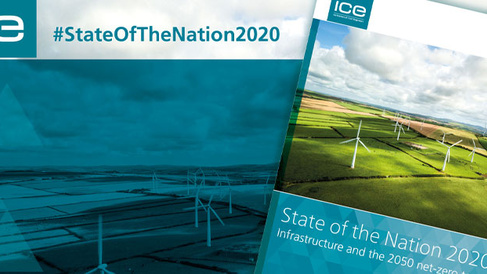
According to the Institution of Civil Engineers (ICE), the UK has a “once-in-a-generation opportunity to recalibrate the economy” and build a net-zero future.
The Covid-19 pandemic has created an unprecedented chance to reset the way we design, build and operate infrastructure in the future. To achieve the ambitious 2050 target, and with infrastructure making up around 60 per cent of total UK emissions, a systemic and wholesale change to the procurement and delivery of infrastructure across the UK is needed. The UK was already failing to meet the less ambitious target of 80 per cent reduction by 2050, so action to make significant changes in infrastructure delivery must happen now, the ICE sets out in its State of the Nation 2020: Infrastructure and the 2050 Net-Zero Target, published today.
Dr Jennifer Schooling, Director of CSIC, is a member of the State of the Nation Steering Group for this year’s timely report, which outlines actions and policy interventions recommended to encourage the sector – and the UK economy more widely – to move towards net zero. Recommendations include: a Net-Zero Infrastructure Plan, to set a strategic direction for the built environment sector; reform of the government’s Green Book, to better reflect the net-zero target in project appraisals and assessment; and updating models of regulation to further promote the achievement of net zero.
Keith Howells, ICE Vice President and State of the Nation Steering Group Chair, said: “The climate emergency and net zero transition present an unprecedented challenge for engineers to solve. We have a critical role and responsibility to do all we can to aid society in this important transformation, but we need a supportive environment that empowers us. The pandemic provides a once-in-a-generation opportunity to recalibrate the economy and create systemic and wholesale change to the infrastructure ecosystem. Our report outlines how, through collaboration and change, we can plan, build and operate infrastructure that meets the needs of the future.”
Dr Schooling, who addresses the theme of zero carbon, resource constraint and resilience in her article for this year’s CSIC Annual Review, said: “Despite the Covid-19 pandemic having a dramatic impact on all our lives, its impact on global CO2 emissions has been relatively small. If industry, government and academia work together, we can create a framework for recovery to embed low-carbon, low-waste outcomes into projects, with the potential for real transformation in industry practice. The stakes are high; if we fail, we risk creating an even greater burden for future generations to deal with.” Dr Schooling is a co-author of the recently-published CSIC and Centre for Digital Built Britain (CDBB) paper titled ‘Flourishing Systems: Re-envisioning infrastructure as a platform for human flourishing’.
Building on the work of the Committee on Climate Change, which published its report ‘Reducing UK emissions: 2020 Progress Report to Parliament’ on 25 June, the ICE State of the Nation report recommends a series of high-level policy solutions to overcome the challenges of achieving net zero emissions, responding to the key policy obstacles the Committee has identified, including: strengthening policy-making; ensuring businesses respond; engaging the public to act; determining who pays; providing the skills; ensuring a just transition; and developing the infrastructure.
The ICE report is the product of an extensive evidence-gathering process including workshops and focus groups in Scotland, Wales, Northern Ireland and the regions of England, inviting contributions from infrastructure experts across the public, private and third sectors. The Institution also surveyed the public about who and where changes should be made, finding only 31 per cent of British adults think Government has a plan for net-zero (YouGov (2020)). The report concludes by setting out actions being undertaken by the Institution for it to continue supporting the built environment sector in the transition to net zero. Through a long-term programme of collaborative work, ICE will seek to share knowledge and best practice on delivering low-carbon solutions across the industry. State of the Nation 2020 is the Institution’s first in-depth look at how the built environment sector can respond to the net zero challenge. This report is a starting point to look further at important issues and the Institution will produce a series of papers that take forward recommendations in the report in coming months.
Download the State of the Nation 2020: Infrastructure and the 2050 Net-Zero Target report
Read more about the recommendations and key themes of the State of the Nation Report 2020 at the ICE Infrastructure Blog
